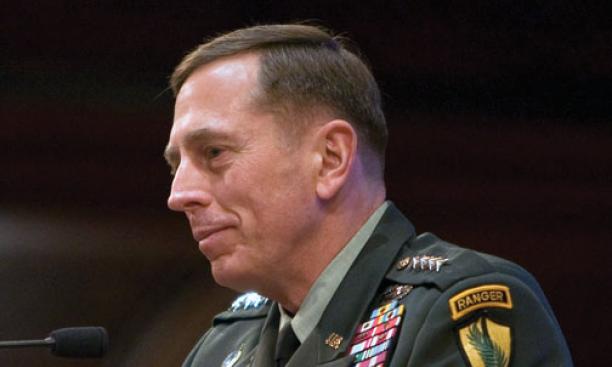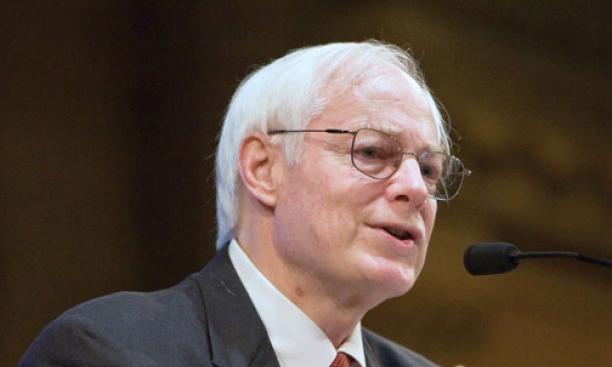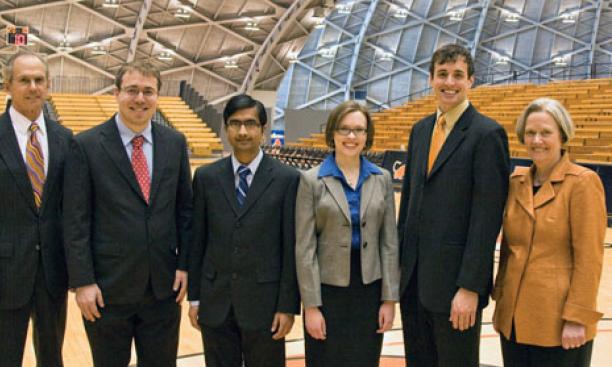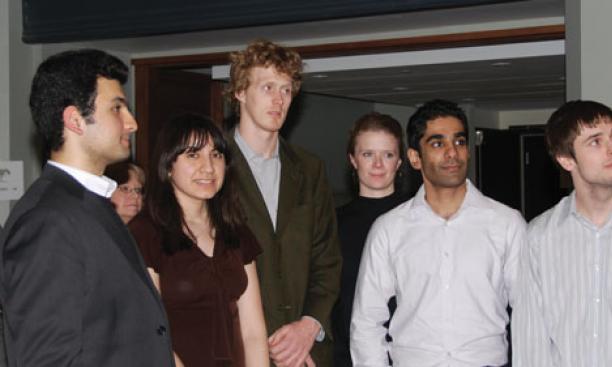


This year’s top Alumni Day honorees, Gen. David Petraeus *85 *87 and former Rep. James Leach ’64, addressed timely topics in their campus lectures Feb. 20: Petraeus, the James Madison medalist, spoke about “strategic leadership” and its applications in Iraq and Afghanistan, while Leach, the Woodrow Wilson Award winner, explored civility in political discourse.
More than 1,200 alumni and family members came to campus for Alumni Day. Participants nearly filled Richardson Auditorium to hear the talk by Petraeus, a four-star general who earned a master’s degree and Ph.D. from the Woodrow Wilson School and who heads U.S. military operations in the Central Command, a 20-nation region that includes Iraq and Afghanistan. He focused his prepared remarks on leadership, using the 2007 U.S. troop surge in Iraq to illustrate how leaders developed ideas and objectives, communicated their plans, and learned lessons in the course of implementation.
The surge, Petraeus said, was not merely a surge of troops, but also a surge of “big ideas,” including the realization that “the human terrain was the decisive terrain.” To provide security, he said, leaders decided that American troops would live among the Iraqi people, rebuild areas that had been secured, and find peaceful reconciliation with some segments of the insurgency. That strategy, Petraeus said, significantly lowered the level of violence in Iraq, paving the way for economic, diplomatic, and political progress.
Petraeus fielded audience questions on several hot topics related to U.S. military operations, including the post-surge political situation in Iraq and whether air strikes in Afghanistan should be limited in order to curb civilian casualties. Asked about a timetable for bringing troops back from Afghanistan, Petraeus said that President Barack Obama’s December 2009 speech at West Point tried to convey two messages — commitment and urgency — and that the July 2011 target would be the beginning of “a process of transition,” not an immediate exit.
Petraeus also spoke about U.S. objectives in Afghanistan, noting that American forces “don’t need to turn Afghanistan into Switzerland in two years.” Instead, current operations focus on eliminating a sanctuary for transnational extremists and enabling the Afghan government to secure its people and earn the legitimacy needed to govern effectively.
Leach, who served in Congress for 30 years as a Republican representative and taught at Princeton for two years, began his remarks by examining government’s effectiveness in a different context. The chairman of the National Endowment for the Humanities, Leach is a staunch opponent of incivility and rigid partisanship in contemporary politics; since November, he has been on a 50-state “civility tour” in hopes of raising the level of discourse.
Some commentators and elected officials label opponents “fascist” or “communist” and raise the threat of secession to bolster their arguments, he noted. While one might be inclined to dismiss these remarks as mere hyperbole, Leach sees a serious problem.
“If 400,000 American soldiers sacrificed their lives to defeat fascism, if tens of thousands gave their lives to hold communists at bay, and if we fought a Civil War to preserve the Union, isn’t it a citizen’s obligation to apply perspective to incendiary remarks that once summoned citizens to war?” he asked. “Asserting that someone who prefers another approach or is a member of a different political party is an advocate of an ‘–ism’ of hate that encompasses Gulags and concentration camps is out of bounds.”
Leach also highlighted the importance of protecting “non-moneyed citizens” in the political arena, challenging the wisdom of the Supreme Court’s January decision in Citizens United v. Federal Election Commission. In that case, a divided Court ruled that the government may not ban political spending by corporations in candidate elections, while critics of the decision say it could drown out the voices of others.
“The public interest can hardly be advanced if the public voice is silenced in public decision-making,” Leach said.
Alumni Day also included speeches by Provost Christopher Eisgruber ’83, on “how to pick a Supreme Court justice”; longtime civil engineering professor David Billington ’50, on lessons from his 50 years on the faculty; and economics professor Burton Malkiel *64, on the global financial crisis.
English and theater professor Jill Dolan, director of the Program in the Study of Women and Gender, spoke about the 40-year history of coeducation at Princeton and gave examples of a current campus culture that portrays women “as more preoccupied with marriage and babies and pleasing men than with scholarship and their professional futures.” The future of women’s studies, Dolan said, “lies in its ability to be the center of productive, incisive critique ... ever aware of the vicissitudes of gendered structures of power.”
In the afternoon, alumni toured the Princeton Plasma Physics Laboratory and attended a career workshop focused on the current job market. The University Chapel was nearly filled for the annual Service of Remembrance, which honors alumni, faculty, and staff members who died in the last year. The Rev. Amy L. Miracle ’85 delivered the memorial address.
Leach and Petraeus were the guests of honor at the annual luncheon in Jadwin Gymnasium, where President Tilghman and Alumni Association leaders presented additional awards for alumni service and academic excellence (see sidebar).
This year’s Pyne Honor Prize, the top award for undergraduates, went to Connor Diemand-Yauman ’10, a psychology major from Chesterland, Ohio, who has been president of several campus groups, including the Class of 2010, the Undergraduate Student Government, and the Nassoons. Calling on his a cappella experience, Diemand-Yauman told the luncheon audience that the Princeton experience is like singing a classic lyric. Each class, he said, “adds its unique interpretation to the song of Princeton,” but all are part of the same “timeless chorus.”


For student entrepreneurs, Alumni Day offered opportunities to present ideas and vie for valuable seed funding. In the new Green Business Plan Competition, organized and sponsored by the Class of 1976, em[Power], a team of five students who aim to build a methane-based power generator at a landfill slum in Karachi, Pakistan, earned the top prize of $10,076. Illa Brown ’76, who chairs Spirit of Service ’76 with classmate Mimi Murley, said that the event allowed alumni to “experience firsthand the excitement going on in environmental and social entrepreneurship on campus.”
At TigerLaunch, the Princeton Entrepreneurship Club’s annual business-plan contest for undergraduates and graduate students, CoAx Systems, a plan to improve the design of well fields for geothermal heat pumps, won first place in business entrepreneurship. Em[Power] and Cocherapy, a Web site that provides speech-therapy videos and social networking for cochlear implant users, split the top prize in social entrepreneurship. Prizes ranged from $1,000 to $5,000.
